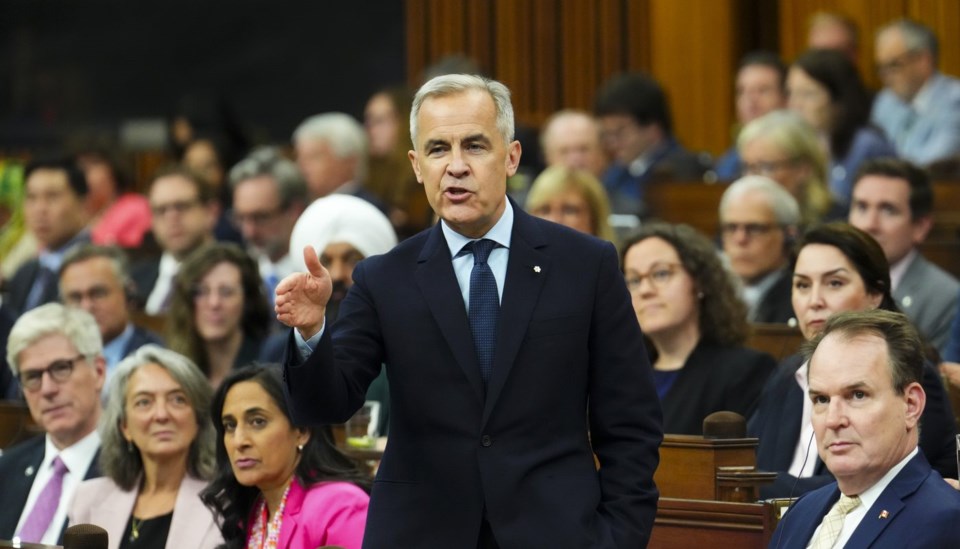OTTAWA ‚ÄĒ Anti-smoking groups are warning the Carney government that its legislation to eliminate interprovincial trade barriers could undermine health standards unless it's amended to add new safeguards.
But Interprovincial Trade Minister Chrystia Freeland’s office insists that the bill will not water down health or environmental laws.
The legislation, which the governing Liberals intend to push quickly through the House of Commons next week, looks to do two things ‚ÄĒ break down interprovincial barriers to trade and labour mobility and speed up approvals for major industrial projects, such as mines, ports and pipelines.
The bill would allow provincial standards to displace federal ones to make it easier to sell Canadian-made goods within the country.
But Rob Cunningham, senior policy analyst at the Canadian Cancer Society, said the current wording could lead to unintended consequences since provincial rules are sometimes weaker.
He warns that, for example, it could prompt the return of products banned by federal regulation, such as those containing asbestos.
"There's a federal measure banning asbestos in products, but provinces allow up to a certain per cent of asbestos in products," he said. "So that would mean that despite asbestos being banned in products for some years now, you could have asbestos return to products. That's not good."
He also suggested the legislation could give tobacco companies space to bring back menthol or flavoured cigarettes, something that "shouldn't be happening."
Freeland’s office said late Friday that the drafters and technical advisers who worked on the bill specifically looked into whether it would affect tobacco rules when they designed it.
"With respect to tobacco and related products, the federal requirements pertain to the manufacture, sale, and promotion of tobacco. Provincial requirements pertain to the use and retail sale of tobacco," said Sarah Jackson, director of operations for Freeland's office.
"Because the federal and provincial/territorial requirements address different elements and do not regulate for the same objective, the Act will not apply to tobacco products."
Earlier Friday, a string of health groups lined up to voice concerns over the bill's vague wording.
‚ÄúWe are worried the tobacco (and) vape industry could take advantage of a less strict provincial standard to erode a stronger federal regulation that is protecting the health of Canadians across the country,‚ÄĚ said Manuel Arango, vice-president of policy and advocacy at the Heart and Stroke Foundation.
Ottawa could also create a specific exception for health through regulations after the bill is passed. It has not indicated it will do so.
Cynthia Callard, head of Physicians for a Smoke-Free Canada, said she worries about the bill being rushed through Parliament since the devil "will likely be in the details in the regulations."
"If these are not well constructed, there is a decided risk of health protection becoming collateral damage of a push for greater economic activity," she said.
"Provincial and federal governments share jurisdiction for (health and environmental) issues, which is why it is important that there is a legal shield against a race to the bottom when it comes to protective regulations. I do not see this in the bill."
The Bloc Québécois, NDP and Green Party are accusing Prime Minister Mark Carney's government of trying to ram the bill through Parliament too quickly without sufficient study.
Carney promised to eliminate federal policies that act as a barrier to interprovincial trade by Canada Day.
Intergovernmental Affairs Minister Dominic LeBlanc laid out the economic case for the trade aspects of the bill during debate in the House of Commons on Friday.
He said the bill will remove "useless costs" and "regulatory confusion" that "hobble Canadians’ ability to trade, connect and work wherever opportunity calls across our country."
‚ÄúIf a good is produced in compliance with provincial standards, it can move throughout the entire country without again having to go up against federal standards,‚ÄĚ he said.
He pointed to various levels of energy efficiency requirements that can stop products from being sold across provincial lines.
He said an Ontario-made product that meets the province's "stringent energy efficiency requirements" could still be blocked from being sold in Quebec or Manitoba if it also does not meet federal standards.
This report by The Canadian Press was first published June 13, 2025.
Kyle Duggan, The Canadian Press



